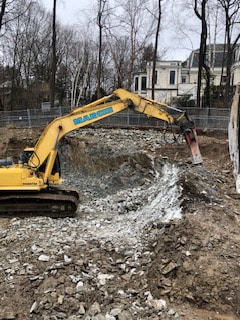Excavation services play a vital role in various construction and renovation projects, ranging from building foundations to landscaping and infrastructure development. While excavation is essential for progress, it also has environmental implications that must be carefully considered. As stewards of the environment, it’s crucial for individuals and organizations involved in excavation projects to be aware of the potential environmental impact and take proactive steps to minimize their footprint. In this blog post, we’ll explore the environmental impact of excavation services and what factors to consider to promote responsible and sustainable practices.
Soil Erosion and Sediment Control
One of the primary concerns associated with excavation is soil erosion. During excavation activities, large amounts of soil may be disturbed, leading to increased runoff and sedimentation in nearby water bodies. Implementing proper erosion and sediment control measures, such as silt fences, sediment basins, and erosion blankets, can help prevent soil erosion and protect water quality.
Habitat Disturbance and Biodiversity Loss
Excavation projects can disrupt natural habitats and lead to the loss of biodiversity. When planning excavation activities, it’s essential to consider the potential impact on local flora and fauna. Avoiding sensitive areas, conducting ecological surveys, and implementing habitat restoration measures can help mitigate the negative effects on wildlife and biodiversity.
Air Quality and Dust Management
Excavation activities can generate dust, which may contain harmful particles and pollutants. Dust management is crucial to protect air quality and the health of workers and nearby residents. Using water suppression systems, covering exposed areas, and minimizing unnecessary excavation can reduce dust emissions.
Noise Pollution
Excavation machinery and equipment can produce significant noise levels that may disturb local communities and wildlife. Employing quieter equipment, scheduling work during appropriate hours, and implementing noise barriers can help minimize noise pollution during excavation projects.
Waste Management
Excavation can generate substantial amounts of waste materials, such as rock, soil, and debris. Proper waste management practices, including recycling and responsible disposal, are essential to reduce the environmental impact of excavation projects. Reusing excavated materials on-site whenever possible can also help minimize waste.
Energy Consumption
Excavation requires the use of heavy machinery and equipment, leading to increased energy consumption and greenhouse gas emissions. Opting for energy-efficient equipment and adopting alternative energy sources, such as electric-powered machinery, can reduce the carbon footprint of excavation services.
Site Restoration and Reclamation
Post-excavation, site restoration and reclamation are vital steps in minimizing the lasting environmental impact. Restoring natural vegetation, implementing erosion control measures, and ensuring proper grading are essential to return the site to its original condition or improve its ecological value.
Compliance with Environmental Regulations
Adhering to local, regional, and national environmental regulations is crucial for responsible excavation services. Understanding and complying with laws related to wetlands protection, air quality, water quality, and habitat conservation are essential for minimizing environmental harm.
Conclusion: While excavation services are essential for various construction and development projects, their environmental impact must not be overlooked. Taking proactive steps to minimize soil erosion, protect habitats, manage waste responsibly, control dust and noise, and restore sites post-excavation can significantly reduce the environmental footprint of these activities. Choosing experienced and environmentally conscious excavation service providers can make a significant difference in promoting sustainable practices and protecting our precious natural resources for future generations. By considering the environmental impact of excavation services and adopting responsible practices, we can strike a balance between development and environmental preservation.

